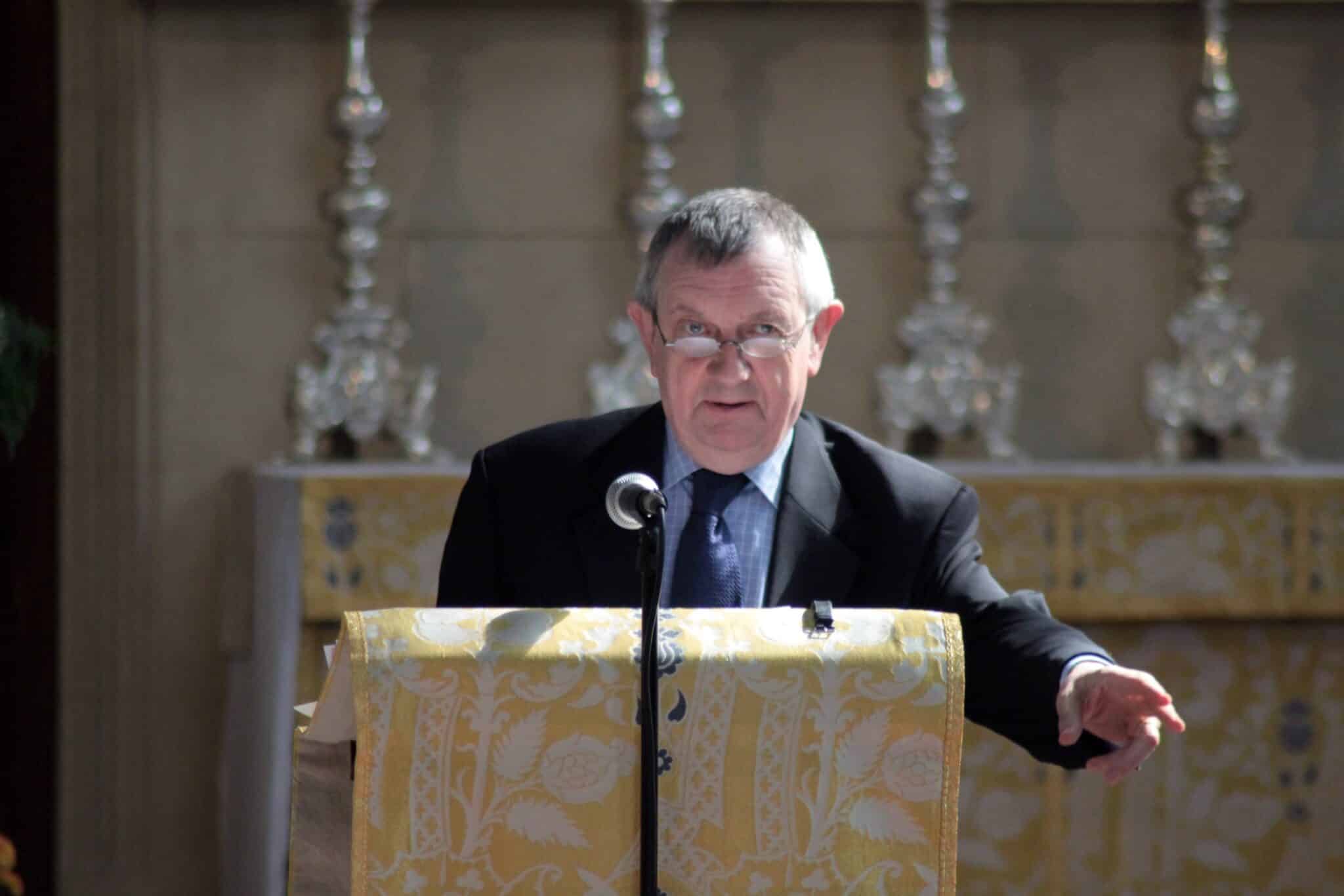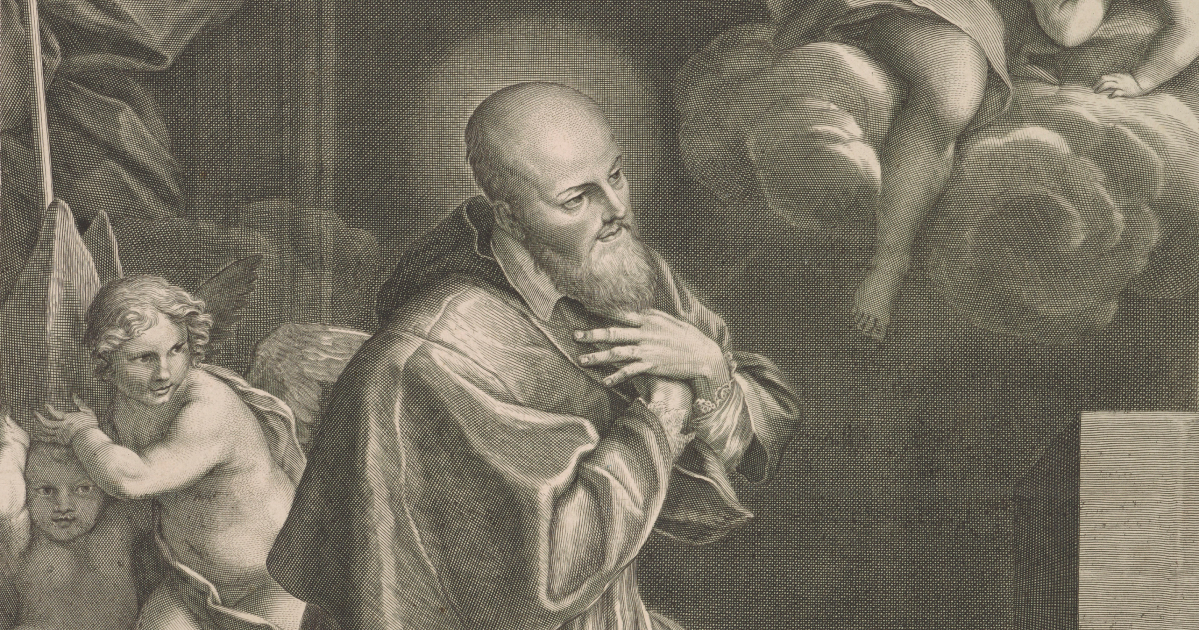Every Sunday we say or sing at mass a text first formulated in 325 at the First Council of Nicaea, in a slightly expanded form adopted at the First Council of Constantinople in 381. I encapsulates central truths of the Christian gospel, which were much debated at the time. The first and most basic clause of that ancient text is “I believe in one God.” The rest of the creed is concerned with Our Lord and his Church, but this first article goes behind all that, to the source of everything and everyone.
When we recite the Nicene Creed, we are reciting it doxologically, as a prayer – like a psalm or hymn. But the primary purpose of the creed is as a standard of orthodoxy, a summary of the basic beliefs that all Christians share, or are meant to share. That is what the Council Fathers at Nicaea and Constantinople intended, and their creed is routinely used as the framework for instruction in the Christian faith. But faith begins and ends in an encounter with a mystery that exceeds human expectation and human comprehension. When we say we believe in God, we quite literally, really and truly, don’t know what we are talking about.
To state that one believes in God may seem clear enough, at least semantically. Each word in it has a readily intelligible sense. And gods have been a familiar item in the furniture of the human imagination from time immemorial – we all know what they are, supernatural beings with mighty powers, but unlike us, immortal. So, whether the statement is true or false, it seems that the meaning of believing in God is clear enough.
Unfortunately this is not the case, and the problem is the term “God”. Because when Christian, Jews or Muslims say they believe in God, whatever else that might mean, it has absolutely nothing to do with anything that might be associated with gods. To say “I believe in one God” is to say “I don’t believe in gods.” The term “God”, and all its cognates in other languages, predates Christianity. The beings it was invented to denote are, like us, inhabitants of the universe. Not all gods are imagined as persons – some are more like elemental forces – but they are all part of the world.
Valhalla or Olympus may have been imagined as inaccessible to living mortals, but they are places, and the relevant gods are located there. But the defining characteristic of Christian belief in God – which it inherits from Judaism – is the certainty that God is no kind of a thing at all, and is not part of this or any universe. This is not because God is nothing, but because God is the source of everything – which means not merely the entire Universe (a notion that’s awe-inspiring, certainly, though at first sight intelligible, but carries the realisation that God is the cause not only of all matter, but of time and space) – and of everything else we can understand or imagine.
It is fundamental to all our thinking about God that we never forget that God is utterly other, utterly different from everything there is, and is therefore utterly unimaginable – beyond human words or thoughts. When we talk about God, we are always using language that isn’t capable of containing God: in human discourse we always have to dress God in borrowed clothes that don’t fit. St Augustine says: “If you understand what you are saying, you are not talking about God.” St Thomas Aquinas insisted that we cannot say what God is, only what God is not. And while believing and explaining at length that through revelation we can know and relate to God, he emphasized that we are united to God “as to one unknown”. Even to say “God is one” or “there is only one God” – while true – is problematic, because “one” is a quantitative term, used to count things of a kind, and there is no categories or kinds of thing to which God belongs. God is unique, but not one of a kind.
Aquinas insisted that all our positive statements about God’s nature and characteristics are true only analogically or metaphorically, not literally – we stretch language designed to deal with finite things to point to transcendent realities that remain beyond our understanding, beyond adequate expression. Nevertheless, following a long (though not unanimous Christian tradition), Aquinas taught that by reason alone we can at least know that God is. Famously, he outlined his Five Ways by which reason pointed to God . He calls them proofs – probati – but I think it’s clear that he didn’t think we could prove beyond possible question the existence of God.
Aquinas is careful to says that it is evident from reason that God exists – we can know God by God’s effects – but because of the variety of human intelligence, experience and psychology, that existence, while evident by reason, was not self-evident in practice: the evidence is persuasive, not conclusive. “The fool has said in his heart: ‘There is no God’,” starts Psalm 14 – but any of us is capable of folly, and at one time or another we are likely to fall into it. So by and large, modern interpreters of Aquinas shy away from calling his Five Ways “proofs”. The most brilliant of them, Fr Herbert McCabe OP, of blessed memory, argued that Aquinas’s Five Ways really boil down to various ways of framing one question: “Why is there anything at all, rather than nothing?”
McCabe’s interpretation goes something like this. Aquinas believed that about everything there was, everything that had happened or would happen, we can ask what its cause was. And in the case of every thing we know, some other thing or things caused or contributed to the cause of its being the way it was. It was one of the tasks of reason – we would nowadays say science – to discover and describe those causal chains. But can we ask the same question about the sum total of all things that have been, are, and will be? Can we ask why the sum total of everything there is exists, rather than there being nothing at all?
Some people deny that this is a real question, because it is obviously not answerable in scientific terms: if you are asking the cause of everything there ever is, has been or will be, including all causality, you can’t then invoke one more example of causality to explain it, since all mere causes are by definition included in the reality you are trying to explain. Bertrand Russell, perhaps the most influential and arguably the smartest public atheist of the 20th century, was content to rule that question out a priori, and to say the universe simply is – we can’t know why, and rational thought just has to start with that brute fact as a given.
McCabe thought that to shrug this question off like that demonstrated a wilful lack of curiosity about existence itself. He thought the question, though unanswerable in any framework of explanation to which humans have access, remained a real question, to which Aquinas’s answer was “This all people call God.”
This is an edited extract from a talk given by Professor Duffy at Fisher House, Cambridge.
Every Sunday we say or sing at mass a text first formulated in 325 at the First Council of Nicaea, in a slightly expanded form adopted at the First Council of Constantinople in 381. I encapsulates central truths of the Christian gospel, which were much debated at the time. The first and most basic clause of that ancient text is “I believe in one God.” The rest of the creed is concerned with Our Lord and his Church, but this first article goes behind all that, to the source of everything and everyone.
When we recite the Nicene Creed, we are reciting it doxologically, as a prayer – like a psalm or hymn. But the primary purpose of the creed is as a standard of orthodoxy, a summary of the basic beliefs that all Christians share, or are meant to share. That is what the Council Fathers at Nicaea and Constantinople intended, and their creed is routinely used as the framework for instruction in the Christian faith. But faith begins and ends in an encounter with a mystery that exceeds human expectation and human comprehension. When we say we believe in God, we quite literally, really and truly, don’t know what we are talking about.
To state that one believes in God may seem clear enough, at least semantically. Each word in it has a readily intelligible sense. And gods have been a familiar item in the furniture of the human imagination from time immemorial – we all know what they are, supernatural beings with mighty powers, but unlike us, immortal. So, whether the statement is true or false, it seems that the<em> meaning</em> of believing in God is clear enough.
Unfortunately this is not the case, and the problem is the term “God”. Because when Christian, Jews or Muslims say they believe in God, whatever else that might mean, it has absolutely nothing to do with anything that might be associated with <em>gods</em>. To say “I believe in one God” is to say “I <em>don’t</em> believe in <em>gods</em>.” The term “God”, and all its cognates in other languages, predates Christianity. The beings it was invented to denote are, like us, inhabitants of the universe. Not all gods are imagined as persons – some are more like elemental forces – but they are all part of the world.
Valhalla or Olympus may have been imagined as inaccessible to living mortals, but they are places, and the relevant gods are located there. But the defining characteristic of Christian belief in God – which it inherits from Judaism – is the certainty that God is no kind of a thing at all, and is not part of this or any universe. This is not because God is nothing, but because God is the source of everything – which means not merely the entire Universe (a notion that’s awe-inspiring, certainly, though at first sight intelligible, but carries the realisation that God is the cause not only of all matter, but of time and space) – and of everything else we can understand or imagine.
It is fundamental to all our thinking about God that we never forget that God is utterly other, utterly different from everything there is, and is therefore utterly unimaginable – beyond human words or thoughts. When we talk about God, we are always using language that isn’t capable of containing God: in human discourse we always have to dress God in borrowed clothes that don’t fit. St Augustine says: “If you understand what you are saying, you are not talking about God.” St Thomas Aquinas insisted that we cannot say what God <em>is</em>, only what God is <em>not</em>. And while believing and explaining at length that through revelation we can know and relate to God, he emphasized that we are united to God “as to one unknown”. Even to say “God is one” or “there is only one God” – while true – is problematic, because “one” is a quantitative term, used to count things of a kind, and there is no categories or kinds of thing to which God belongs. God is unique, but not one of a kind.
Aquinas insisted that all our positive statements about God’s nature and characteristics are true only analogically or metaphorically, not literally – we stretch language designed to deal with finite things to point to transcendent realities that remain beyond our understanding, beyond adequate expression. Nevertheless, following a long (though not unanimous Christian tradition), Aquinas taught that by reason alone we can at least know that God <em>is</em>. Famously, he outlined his Five Ways by which reason pointed to God [see Robert Verrill OP, <em>passim</em>]. He calls them proofs – <em>probati</em> – but I think it’s clear that he didn’t think we could prove beyond possible question the existence of God.
Aquinas is careful to says that it is <em>evident</em> from reason that God exists – we can know God by God’s effects – but because of the variety of human intelligence, experience and psychology, that existence, while <em>evident</em> by reason, was not <em>self-evident </em>in practice: the evidence is persuasive, not conclusive. “The fool has said in his heart: ‘There is no God’,” starts Psalm 14 – but any of us is capable of folly, and at one time or another we are likely to fall into it. So by and large, modern interpreters of Aquinas shy away from calling his Five Ways “proofs”. The most brilliant of them, Fr Herbert McCabe OP, of blessed memory, argued that Aquinas’s Five Ways really boil down to various ways of framing one question: “Why is there anything at all, rather than nothing?”
McCabe’s interpretation goes something like this. Aquinas believed that about everything there was, everything that had happened or would happen, we can ask what its cause was. And in the case of every thing we know, some other thing or things caused or contributed to the cause of its being the way it was. It was one of the tasks of reason – we would nowadays say science – to discover and describe those causal chains. But can we ask the same question about the sum total of all things that have been, are, and will be? Can we ask why the sum total of everything there is exists, rather than there being nothing at all?
Some people deny that this is a real question, because it is obviously not answerable in scientific terms: if you are asking the cause of everything there ever is, has been or will be, including all causality, you can’t then invoke one more example of causality to explain it, since all mere causes are by definition included in the reality you are trying to explain. Bertrand Russell, perhaps the most influential and arguably the smartest public atheist of the 20<sup>th</sup> century, was content to rule that question out <em>a priori</em>, and to say the universe simply is – we can’t know why, and rational thought just has to start with that brute fact as a given.
McCabe thought that to shrug this question off like that demonstrated a wilful lack of curiosity about existence itself. He thought the question, though unanswerable in any framework of explanation to which humans have access, remained a real question, to which Aquinas’s answer was “This all people call God.”
<em>This is an edited extract from a talk given by Professor Duffy at Fisher House, Cambridge. </em>

















